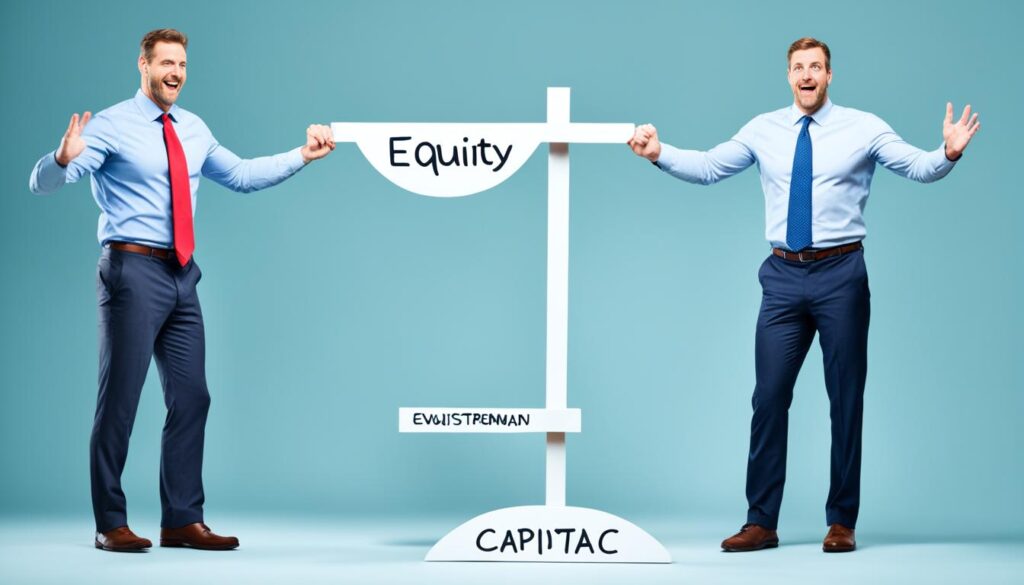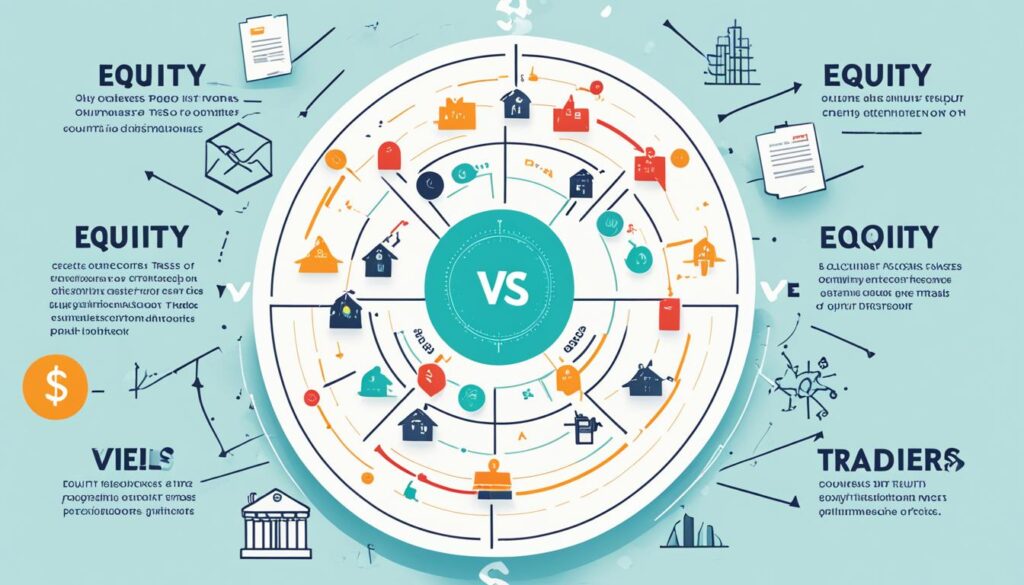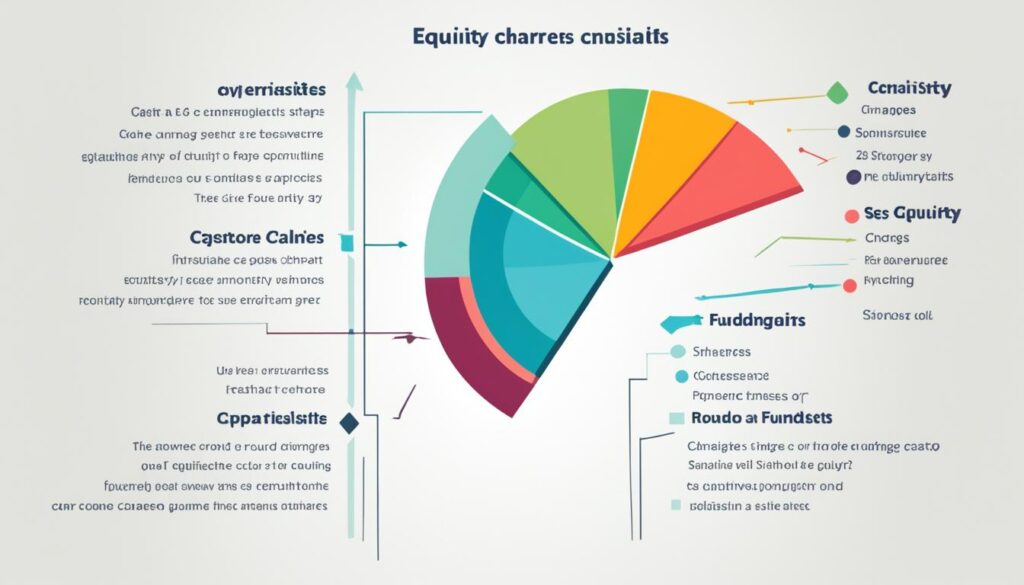Getting capital from venture capitalists (VCs) is a big step for startups. But figuring out the right amount of equity to give can be tricky. This piece will show you how to decide on the best equity share between founders and VCs. You’ll learn about certain important things, like what’s a fair amount, how to negotiate, and ways to look after your rights. In the end, you’ll better understand the ideal equity to offer VCs. This means you can get the funding you need for growth and still have some control.
Have you ever wondered the perfect trade-off in giving equity to VCs? Is there a balance between getting funds and keeping a large piece of your company? This article will dig into that question. It’ll give you info to make this key choice with confidence.
Key Takeaways
- Determining the right equity split with venture capitalists is a critical decision for startups.
- Think about your business’s stage, how much it’s valued, and funding needs when discussing equity.
- VCs usually own 20-40% of early-stage startups.
- To keep control, founders should negotiate well and have the same goals as their investors.
- It’s important to thoroughly check VCs and look at other funding options too.
Understanding Venture Capital and Equity

Venture capital (VC) is key for startups and early-stage companies. They give these firms the money to grow. In return, these investors get a piece of the company. This means they own part and can help make big decisions.
What is Venture Capital?
Venture capital is money from investors for new businesses. It comes from firms that hope to see big profits in the future. These investors know it’s risky but they take the chance for big rewards on their venture capital investment.
The Role of Equity in Venture Capital
When companies get VC funds, they give up a part of ownership. This gives investors a role in making important choices for the company. The reason for this equity in VC funding is to make sure both founders and investors gain from the company’s success.
Venture capitalists care about a company’s future. By investing and getting a share of the company, they help it grow. This way, both the startup and the investors win if the business does well.
Factors to Consider When Determining Equity

When you give equity to venture capitalists (VCs), look at a few big things. Think about the stage of your business, how much your company is worth, and how much money you need. These points are really important in deciding how much ownership founders keep compared to VCs.
Stage of Your Business
What stage your startup is at matters a lot when working out equity with VCs. Startups just beginning, or in their first few rounds of funding, often give up more ownership. This helps them get the cash they need to grow. Usually, founders of these companies might have to let go of 20-40% of their business to VCs.
Valuation of Your Company
The valuation of your startup really counts too. If your startup is valued high, you might have to give up less ownership. But if the value is lower, you could end up giving more of your business to VCs. It all depends on your startup’s worth compared to the investment.
Amount of Funding Needed
How much money your startup needs is a critical factor too. Companies looking for a lot of money might need to give up more of the business. This is to make the deal more attractive to investors. However, if you need less money, you could keep more of your startup for yourself.
Looking at these factors to determine equity split helps founders make smart choices. They make sure they get the right amount of funding to grow while keeping control. It’s all about finding the right balance.
Typical Equity Ranges for Venture Capital Investments

When considering venture capital (VC) investments, certain equity ranges are standard. These ranges depend on factors such as your business’s stage and its value. They also account for how much funding you need.
Early-Stage Startups
Early-stage startups often give VCs more equity. This is due to the risks and uncertainties.
early-stage startups may offer 20-40% equity to VCs
. The upside is the potential for your company to make big gains.
Growth-Stage Companies
Once startups are beyond the early stage, they might need less funding but are less risky. At this point, the
typical equity range for VC investments is 15-30%
. These companies have proven business models and are on their way to profitability. VCs might ask for less equity in return for their investment.
| Startup Stage | Typical Equity Range for VC Investments |
|---|---|
| Early-Stage | 20-40% |
| Growth-Stage | 15-30% |
Remember, these ranges are not set in stone. The actual equity share depends on your specific situation and discussions with the VC. Founders must choose wisely and aim to keep a good share of ownership.
How much equity should I give to VCs?

The equity you share with VCs depends on many things. This includes the stage your business is in, its valuation, and how much funding you need. At the beginning, startups usually give 20-40% equity. For companies further along, this drops to about 15-30%. The exact percentage will vary.
It’s important to balance getting the money you need with keeping control. The split between founders and VCs can change. It depends on your company’s life stage, value, and goals. When figuring out what VCs get, fairness is key for a successful partnership.
| Startup Stage | Typical Equity Share for VCs |
|---|---|
| Early-Stage | 20-40% |
| Growth-Stage | 15-30% |
These figures are just a starting point. Remember, the right equity share is unique to each startup. The goal is to negotiate well and think about the future. This way, everyone’s interests are balanced.
Negotiating Equity with Venture Capitalists

To negotiate equity with venture capitalists, you must prepare well and think strategically. As a founder, your pitch needs to show why your business is special, how it can grow, and why it should get the funding and equity it wants.
Building a Strong Pitch
When you pitch to VCs, highlight your business’s advantages, its future financial outlook, and the strong team behind it. Talk about the strategies for founders when offering equity. Explain clearly how the offered equity matches your plans for growth. Be ready to talk about negotiating equity with VCs and how the investment will reach important goals.
Leveraging Competitive Offers
If you can get more than one offer from VCs, it’s a good position. Use the tips for pitching to venture capitalists to show why you stand out and how other investors are interested. This could lead to better deals, like a higher company value and a better equity share.
It’s crucial to strike a balance between getting the needed funds and keeping control as the founder. A smart approach to negotiating equity with VCs can help you get the investment and still look out for your business in the long run.
Protecting Your Interests as a Founder

When talking to venture capitalists (VCs) about splitting equity, it’s vital to look out for yourself. Make sure you keep a big part of the company. Consider these strategies to keep a good share:
Retaining Significant Ownership
Founders aim to keep much of the company while getting the needed funding. Negotiating well can help you own between 20-50%. This keeps you in control as the business grows. Protecting founder equity is key to keep decision-making power.
Understanding Investor Rights
Getting VC money means understanding their rights. You should know about voting, being on the board, and other agreements. Negotiate to keep your business’s direction under your control.
Aligning Incentives
It’s important to work together with VC investors on the same goals. You can tie equity deals to reaching certain goals. Doing this helps keep everyone focused on success while protecting your interests.
The Importance of Due Diligence

Before taking on a venture capital (VC) investment, do your homework. It’s important to look closely at potential investors. This ensures they will be a good match for your startup. It’s all about making a smart choice.
Evaluating the VC Firm’s Track Record
When you check out VC firms, pay attention to their previous deals. See how well those companies did. If the firms have a history of successful deals, it could mean they know what they’re doing. This knowledge could be a big plus for your startup’s growth.
Assessing Strategic Fit
Looking beyond just the money, also check if the VC’s goals match yours. Think about what the VC focuses on and how they help businesses like yours. Their connections and resources should line up with what your startup needs. This partnership can really make a difference in your success.
Doing due diligence for VC investments is key. It helps you choose the right VC firm for your startup. This makes picking the best option for both sides easier. A good fit is crucial for success.
Alternative Financing Options
Venture capital is a common way to fund high-growth startups. But, it’s not the only choice out there. Startups can look into other financing options that match their needs better.
Bootstrapping
Bootstrapping is when founders fund their own startup. This way, they keep full control of the company. They use profits, personal savings, or loans to grow. This avoids sharing their company with outside investors.
This method needs discipline and creativity. Starting small is often part of the process. However, it’s a strong choice for those who would rather not give up equity.
Crowdfunding
Platforms like Kickstarter and Indiegogo provide crowdfunding. Startups can raise money without giving away part of their company. By offering pre-orders or rewards, they appeal to a broad network of supporters.
Crowdfunding also helps validate business ideas and grow a customer base. It’s a great way to get early-stage financing.
Angel Investors
Angel investors are successful individuals who fund startups. They offer more than money, providing mentorship and valuable connections. In return, they get a share of the company.
Working with angel investors might be easier than with venture capitalists. They often have more flexible deals for founders. Choosing the right angel investor is crucial, to make sure their goals align with yours.
Legal and Tax Considerations

When you talk about how to split equity with venture capitalists, think about the legal things and the tax consequences. The way you set up your equity is very important for the future and health of your business.
Decide if you will give out common stock, preferred stock, or convertible notes. Each one offers different things like who gets paid first or the tax rules. Also, know what rights the investor has, like if they get to vote on things or how they get their money back. Make sure these things match what you want as the business’s owner.
| Legal Aspect | Considerations |
|---|---|
| Securities Structure | Common stock, preferred stock, convertible notes |
| Investor Rights | Voting rights, board representation, liquidation preferences |
| Equity Vesting | Vesting schedules, cliff periods, acceleration triggers |
| Tax Implications | Capital gains, income tax, employee stock options |
The way you split the equity can impact taxes a lot. Founders need to think about how their shares will be taxed. The way you give out stock to employees can also change the tax picture.
It’s a good idea to get help from legal and tax experts. They are key when you deal with the legal and tax sides of VC investment and equity sharing. Their advice can ensure your equity structure sets your business up for success.
Common Pitfalls to Avoid

When talking equity with venture capitalists, watch out for common mistakes. A key tip is to avoid overvaluing your business and giving away too much equity.
Overvaluing Your Business
Founders often think their startup is worth more than it really is. This can scare off investors and hurt your chances of getting needed funding. Do in-depth market studies, financial checks, and look at your competitors to set a correct value. A too-high value can block your funding path and future success.
Giving Away Too Much Equity
Don’t be too generous with the equity you give to VCs. Giving a big part of your company can weaken your role and control. Try to balance getting funds and keeping a good share of your own company. Advice for founders is to know the industry benchmarks, bargain hard, and look into other ways to fund without giving up too much.
Avoiding these mistakes can help founders get VC funds while keeping control. It’s all about knowing the right approach to equity with VCs and valuing startup equity.
Balancing Control and Growth
When dealing with venture capitalists, finding balance is crucial. You need enough funding for growth yet want to keep control as a founder. Consider these key strategies:
Maintaining Founder Control
For startup founders, keeping a large stake in your company is vital. This lets you keep maintain control over where your business is headed. It’s about how you divide the shares. Make sure you and your team stay in control to make big choices.
Fostering a Collaborative Relationship
Still, working well with your VCs is important. These professionals offer help that can get your company growing faster. By working together well and talking openly, you can use their knowledge while keeping control as the founder.
Finding the right mix of funding and control is the challenge. Knowing how to play the equity game, smart negotiation, and building a strong relationship with your VCs are the keys to success.
Conclusion
Determining how much equity goes to founders or venture capitalists is key. You need to think about many things. These include where your business is at, its worth, how much money you need, and your big goals. All of these factors matter in deciding who gets what.
When figuring out conclusion on VC equity split, knowing common equity shares is critical. It’s also important to bargain well and look out for your rights. Finding the right mix of getting funds and keeping control is vital for your startup’s success and growth.
At the end of the day, final thoughts on giving equity to venture capitalists vary. There’s no universal answer. Your startup’s path is its own, and how you divide equity will reflect that. By doing solid research, setting clear objectives, and understanding your vision, you can choose what’s best for your business. This approach will aid in its growth and ensure your vision as the founder is upheld.
